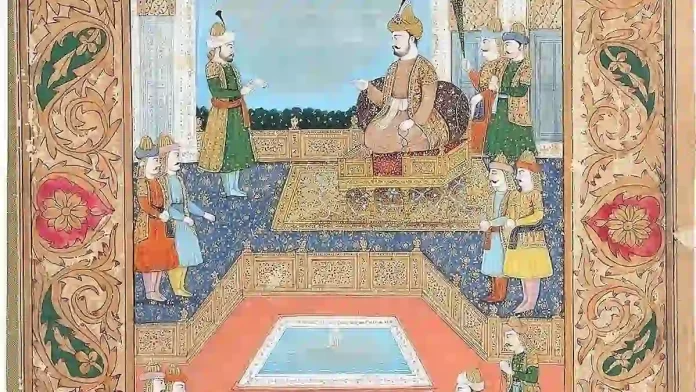Muhammad bin Tughluq (1325-1351), the eighteenth Sultan of Delhi, remains an enigma wrapped in a riddle. Hailed as the Sultan with an unparalleled thirst for knowledge, his reign oscillated between visionary innovations and disastrous miscalculations, earning him epithets ranging from “The Wisest Fool” to “The Mad Sultan.”
Was he a misunderstood genius or a tragic victim of ambition exceeding reality? Exploring his life and actions paints a captivating, if complex, portrait of a ruler at the crossroads of learning and chaos.
Family Background
Muhammad bin Tughluq was born to Ghiyath al-Din Tughluq, who founded the Tughlaq dynasty after taking control of the Delhi Sultanate. He is also known as Prince Fakhr Malik Jauna Khan, Juna Khan or Ulugh Khan.
His father’s ancestry is debated among modern historians, because the earlier sources differ widely regarding it. Amir Khusrau, in his Tughluqnama, states that Tughluq described himself as an unimportant man (“awara mard”) in his early career.
Tughlaqnama declares Tughlaq to have been a minor chief of humble origins. There are numerous views on the ancestry of Tughluq. Ranging from Turko-Mongol, to Turkic origins.
Ferishta states that Tughluq’s father was a Turkish slave of Balban and his mother a Jat lady of the Punjab. Thus, Tughluq’s ancestors were of mixed origin including Turko-Mongol and Jats and the King also used to say that he was “bound to all Indians by ties of blood and relation.”
From a young age, Muhammad displayed an insatiable curiosity. He devoured scriptures on logic, philosophy, mathematics, astronomy, and even medicine. He conversed fluently in multiple languages including Persian, Arabic, Sanskrit and Turkic.
Ibn Battuta, the famous traveler and jurist from Morocco, wrote in his book about his time at the Sultan’s court.
Ascending to Power
In 1325, upon his father’s death, Muhammad bin Tughlaq ascended the throne, his sharp intellect and administrative skills seemingly promising a glorious reign.
He swiftly conquered Doab and repelled Mongol invasions, showcasing his military prowess. He even established diplomatic ties with China, seeking knowledge and trade partnerships.
Experimentation and Innovation
Driven by his intellectual fervor, Muhammad embarked on ambitious reforms. He introduced a token currency – silver and copper tokens to replace gold – aiming to combat inflation and finance military expeditions. However, logistical flaws and public suspicion led to chaos and fueled rebellions.
Undeterred, Muhammad switched gears, introducing land tax reforms and agricultural initiatives. He established a department dedicated to agriculture, “Diwan-i-Khirat,” aiming to boost production and revenue. He also commissioned public works, including hospitals and canals, reflecting his concern for social welfare.
The Price of Ambition: But ambition often outpaced reality. His decision to shift the capital from Delhi to Devagiri, closer to the Deccan Plateau, proved disastrous. The logistical nightmare and disruption to trade and administration triggered widespread rebellion. He was forced to abandon the plan, but the damage was done.
Misunderstood Visionary or Flawed Ruler? Muhammad’s legacy remains fiercely debated. Some see him as a visionary reformer, his failures stemming from the sheer novelty of his ideas. Others point to his lack of pragmatism and disregard for public sentiment, highlighting his disastrous policies like the token currency.
Beyond the Controversies: Regardless of interpretations, Muhammad’s contribution to knowledge and scholarship cannot be denied. He established numerous madrasas (Islamic schools) and libraries, ensuring the preservation and transmission of learning. He patronized scholars and poets, enriching the cultural landscape of his era.
The Shadow of Madness: However, whispers of mental instability linger. Accounts of erratic behavior, like ordering the massacre of Kannauj residents, contribute to the “Mad Sultan” image. Yet, such episodes could be attributed to ruthless tactics in a turbulent political climate, rather than genuine madness.
Holi Celebration
Muhammad bin Tughlaq was the first Sultan of Delhi to participate in the public celebration of Holi as per UPPCS 2004.
Further, he established a separate Agriculture Department and had planned the ‘rotation of crops’.
A Sultan of Contradictions
In the end, Muhammad bin Tughlaq remains a paradox. He was a scholar-king, yet his policies often lacked practical grounding.
He was a visionary, yet his ambitions fueled chaos. He was a patron of knowledge, yet his reign saw public unrest. This complexity makes him a fascinating figure in Indian history, a ruler whose contradictions continue to intrigue and provoke debate.
The king was freed from his people and they from their king.’ On whose death did Badayuni comment this
